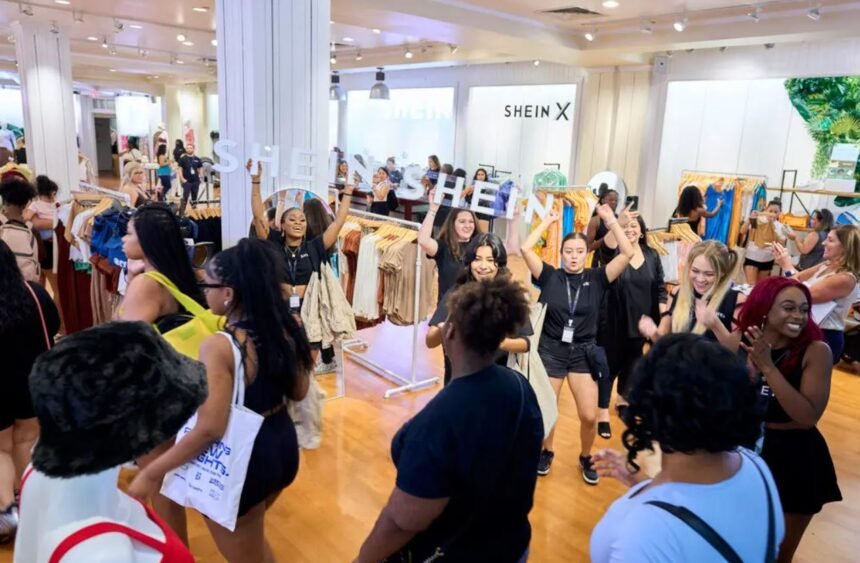Trade Law: Many packages from international e-commerce companies like Shein and Temu are exempt from U.S. customs duties due to a nearly century-old provision. Trade associations in the United States want it modified.
Since e-commerce destroyed the industry’s old business patterns, American retailers have faced an existential crisis. But, according to a group of retailers and regulators, their latest threat comes from a nearly century-old trade norm that gives their e-commerce rivals—many of which were created in China—an unfair advantage.
Also Read: Cloud Computing: Cloud Computing Industry To Increase By USD 429.6 Billion Between 2022 And 2027
The de minimis rule allows businesses to export products worth less than $800 into the United States without paying the tariffs and fees imposed by Customs and Border Protection. Every day, about three million de minimis shipments enter the United States, with textile and garment products accounting for roughly half of those shipments.

The rule, according to critics, hurts American businesses. They said that Chinese-founded enterprises such as Shein and Temu, both low-cost merchants, would send products directly from their overseas warehouses to customers’ homes, and that just a few of those parcels were worth more than $800. However, products manufactured overseas and then transported in bulk to U.S. retailers — where they are held in warehouses before being shipped to customers — are less likely to fall under the $800 level. (In 2022, Shein constructed a distribution center in Indiana to keep overseas merchandise before shipping it to clients.)
Critics further say that shipments falling under the de minimis rule provide an uncontrolled avenue for goods created by forced labor to reach the United States. The House Select Committee on the Chinese Communist Party issued a report in June that concluded Temu and Shein were likely responsible for more than 30 percent of all shipments imported into the United States under the de minimis clause. Retailers in the United States want the rule altered. If it isn’t, they argue, firms will be forced to relocate their warehouses and the jobs that go with them outside of the United States.

According to a Shein spokesperson, the shop “continues to make import compliance a priority” and “the de minimis provision is not critical to the success of our business.” Shein’s executive vice chairman stated in July that the corporation was “eager” to collaborate with lawmakers to help improve de minimis. A Temu representative agreed with Shein, adding that Temu’s “growth isn’t dependent on the de minimis policy” and that the company is “supportive of any policy adjustments made by legislators that align with consumer interests.”
The de minimis regulation, according to Jim Marcum, CEO of bridal shop David’s Bridal, “played a significant role” in the financial strain that prompted the firm to declare bankruptcy in April, the second time in five years. David’s Bridal reported paying over $20 million in fees to US Customs in 2022. Mr. Marcum claimed that competitors located in China that ship clothes directly to customers paid nothing. He noted that over the course of six years, David’s Bridal paid around $100 million in duties that could have been invested in modernizing its business.

“You can see the enormity of that — the disadvantage that we’ve had to face,” Mr. Marcum said.
According to Ron Sorini, a lobbyist and trade expert who is working with a group of 20 U.S. retailers to amend the de minimis entry law, it creates an incentive for corporations to shift distribution offshore. The Ship Safe Coalition has proposed a reform that would extend the use of de minimis to US distribution centers in foreign trade zones. Companies in these zones are not required to pay customs costs on imported goods right away. Instead, they pay the fees when the products are delivered to clients. This delay helps them manage cash flows, but unlike products transported from a warehouse abroad, things shipped from foreign trade zones aren’t immune from fees if they’re worth less than $800.

“We believe that the administration needs to use its executive authority to divorce all e-commerce shipments from receiving de minimis treatment,” Ms. Glas said.
The American Apparel & Footwear Association, a trade association representing over 300 US companies, is gathering input from its members for a policy recommendation that will be published in the coming weeks. “While it may be complicated — and too complicated — for some members of Congress to figure out, it is not too complicated for business people to figure out,” said Peter Bragdon, general counsel at Columbia Sportswear, a member of the Ship Safe Coalition. “People are taking advantage of it, and it’s having an effect on people, on businesses.”
Frequently asked questions
Who regulates trade in the US?
The Commerce Clause of the United States Constitution grants Congress exclusive authority over trade transactions between states and with foreign governments.
What are the 4 principles of international trade?
The present international trade regime is founded on four fundamental ideas. Most-Favored-Nation Treatment (MFN), National Treatment (NT), tariff binding, and the general prohibition of quantitative constraints are among these principles, in no particular order of significance.
What is U.S. trade policy?
The World Trade Organization (WTO) agreements, which form the “multilateral bedrock of U.S. trade policy,”1, its tariff, tariff rate quotas, 14 reciprocal free trade agreements, 5 preferential trade programs, 51 trade and investment framework agreements, and 48 bilateral agreements comprise the United States’ trade policy and investment system.
Is Shein from China or India?
Shein was created in China, but its headquarters are now in Singapore, and the clearance from India means that the government now considers Shein to be a non-Chinese corporation, according to the article.
Click here to see the latest HNN post on Instagram.
Also Read: Electric Planes: Always A Pipe Dream, Are Finally Taking To The Skies
image source: google




































